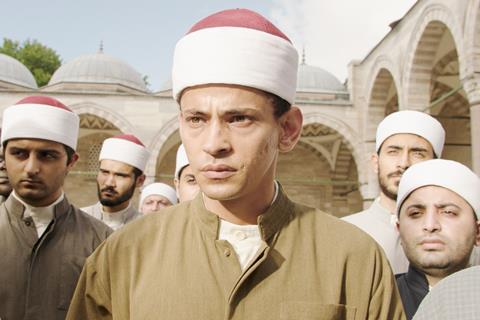A ’Name of the Rose’ style murder mystery transposed to Cairo has the potential to travel further

Dir/scr: Tarik Saleh, Sweden/France/Finland. 2022. 126 mins.
“Your soul is still pure. But every second in this place will corrupt it.” These words spoken to Adam (Tawfeek Barhom), a wide-eyed newly-arrived student at the Al-Azhar University in Cairo, turn out to be prophetic. The centre of power for Sunni Islam, presided over by the Grand Iman, Al-Azhar is a place of learning. But, in this labyrinthine but satisfying thriller by Tarik Saleh, it is also a hotbed of allegiances and intrigue. After the sudden death of the Grand Iman, Adam finds himself embroiled in behind the scenes machinations intended to influence the choice of the next incumbent. It’s a precarious situation for Adam, requiring a steep learning curve, deft political manoeuvring and carrying the risk of a heavy price should he inadvertently cross the wrong person.
A labryinthine but satisfying thriller
Saleh’s follow up to The Nile Hilton Incident shares with that film a sinuous approach to plot and, in the reliably excellent Fares Fares, a lead actor. Although perhaps not quite as lean and efficient in its storytelling as Nile Hilton, Boy From Heaven is an ambitiously complex story of religious espionage. It was conceived as a Name Of The Rose-style mystery transposed to a Muslim world, but also has much in common with Jacques Audiard’s A Prophet in its backdrop of factions and power plays and in the trajectory of its central character, from innocent greenhorn negotiating a web of alliances to jaded, compromised survivor. There’s definite commercial potential here, as evidenced by the fact that it has already sold to Picturehouse in the UK.
Barhom is impressive throughout as Adam, the son of an overbearing fisherman who routinely beats all three of his sons for the misdemeanours of one. When Adam is accepted to Al-Azhar, he is initially fearful of his father’s reaction, his eyes scanning the floor rather than meeting his father’s scalding displeasure. But the older man grudgingly concedes that God’s will trumps all else, even the wishes of a father.
Once at Al-Azhar, a bastion of tradition in the heart of Cairo’s thronging, modern metropolis, Adam is a serious and conscientious student, who is nicknamed “sardine” by his less reverent bunk-mate. It’s his air of spotless moral probity which catches the eye of Zizo (Mehdi Dehbi), who has been working secretly as the eyes on the inside of the university for Colonel Ibrahim (Fares Fares). Fearful that his cover has been blown, Zizo is seeking his own replacement, but is murdered before he can broach the idea to Adam. Fares plays the Colonel as something of an enigma, dishevelled but trickily dangerous, ruthless but ultimately principled. He’s a man who finds it disconcertingly easy to switch between the carrot approach (he offers medical assistance to Adam’s father) to the stick (hints of burned fishing boats). Adam soon finds himself forced to infiltrate a group of hard line jihadists, led by the sour-faced Soliman (Sherwan Haji).
Boy From Heaven is a handsomely shot work, with Turkey doubling persuasively for Egypt (Saleh was placed on a list of undesirables in 2015 and risks arrest if he sets foot in Egypt). Widescreen shots capture the sober grandeur of the institution and the tumult of the streets outside; God’s eye camera positions offer glimpses of the covert meetings and calculated campaigns of a world which is driven by the schemes and whims of powerful men. Where the film stumbles slightly is in the screenplay, which mostly weaves together satisfyingly, but occasionally gets itself tangled up in exposition.
Production companies: Atmo Rights AB, Memento Production
International sales: Memento International, sales@memento-films.com
Producer: Fredrik Zander, Kristina Aberg
Production design: Roger Rosenberg
Cinematography: Pierre Aim
Editing: Theis Schmidt
Music: Krister Linder
Main cast: Tawfeek Barhom, Fares Fares, Mohammad Bakri, Makram J. Khoury, Sherwan Haji, Mehdi Dehbi























